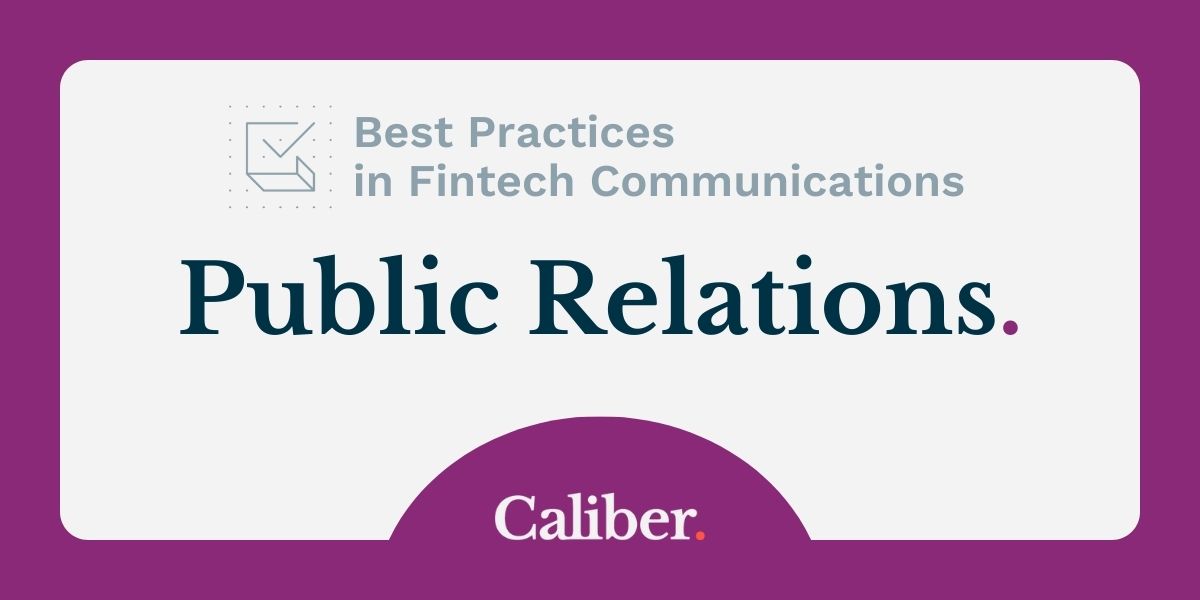Is Your Fintech Newsworthy.

Are you ready for primetime? When is the right to pull the trigger on your finserv and fintech PR strategy?
Everyday we speak with business leaders in fintech and financial services eager to up their profile with a PR strategy. But what should your expectations be if you’re not the latest neo-bank, wealth app or bitcoin flavor of the month?
One of the first things to assess is what opportunities exist for news around your business and industry sector. Every agency loves to win over a new client but it’s only worth engaging a firm if there is existing market interest or a unique story to tell.
During our initial audit we want to learn if the business has a compelling story to tell that the market, journalists and influencers want to hear.
Harvey Hudes, CEO of Caliber, says, “If a company is investing in PR then they should expect a return on that investment — and if the opportunity appears limited, we believe it’s our responsibility to inform and educate.”
So how do you figure out if your fintech or finserv is newsworthy? It’s important to look both internally and externally
Assess the market
Start by reviewing the amount of media coverage your specific industry sector is attracting. What’s receiving coverage, and what kind? Is it thought leadership, announcements or broader market trends? Also explore whether your competitors are generating press. Is the coverage just within industry trade press or is it spreading out to more mainstream/business media?This will help to manage expectations. If it seems that no one is taking advantage of the market opportunity – then it’s likely one might not exist right now.
If there isn’t significant coverage it’s worth assessing why the coverage is limited. Is your business ahead of the curve or perhaps the conversation has moved on? In either case, it’s worth probing deeper to identify what underlying issues or themes are resonating and then think about how you might make the connection for your business.
Ultimately we try to determine if the media wants to hear what you have to say. This doesn’t mean that potential clients don’t care about your business or that your story doesn’t matter. Instead, this analysis helps determine an appropriate base-level understanding of how media are likely to react to your story. It’s then then up to us, as your partner, to take that information and build a PR strategy that looks for other ways to incorporate the company, its data, content, and/or spokespeople into additional potential story angles and topics.
As consultants who take pride in building relationships with the media, we want to develop a finserv or fintech PR strategy that delivers results. It’s our job to craft a story that resonates with the media. Conducting research prior to working with a company allows us to take a more methodical approach in evaluating the current media landscape, and where and how, a company can fit into the conversation and news cycle.
Look inward
It’s equally important to think about the stories you can tell and the opinions or insights you can offer as a business and leader that will set you apart.
Take a look at the media coverage your competitors attract. Then ask what your company can contribute to expand, complement or offer a different point of view to the ongoing conversation?
Additional questions to ask include:
- What conversation do you want to start?
- Do you have a contrarian point of view on issues that should be discussed? Are you comfortable sharing these publicly? What are the risks associated in doing so?
- Is there a bigger trend out there that your company can tie its story to?
- Do you sit on data to help you tell or support media coverage?
It’s also not a requirement to have a proactive approach towards the media. It may make sense to play a more passive role. At the very least it’s important to have a clear sense of your message and viewpoints should the media come calling.
But a willingness to be contrarian can be a good way to spark interest and conversation. Just be sure these views are important to you and you can back them up.
Assessing your homegrown “talent” is also key. Business leaders will usually be required to engage with the media in some form, but having a bench of subject matter experts to call on can also give you more options to comment on a broader range of topics. Not all executives and leaders are “naturals” when it comes to the media. Finding someone who can perform well is an advantage, but not a requirement. Prioritizing media training can go a long way. It’s also a great way to diversify the responsibility of being a spokesperson across a broader group of leaders – from a time and risk diversification standpoint.
So, back to the original question, “is your company media worthy”? Perhaps the better question is, “how can your company become more media worthy?”
PR is not something every company should prioritize.
Whether you have the expertise internally or you’re working with an outside partner to craft your finserv or fintech PR strategy, the key is to continue to develop new angles and ways of telling your story leveraging data, commentary, content marketing, partnerships and other avenues that raise your profile and interest in your company.
Let’s talk about what kind of media opportunities exist for you.
Up Next.
Q&A with Michelle Mead, Director.
Read More

